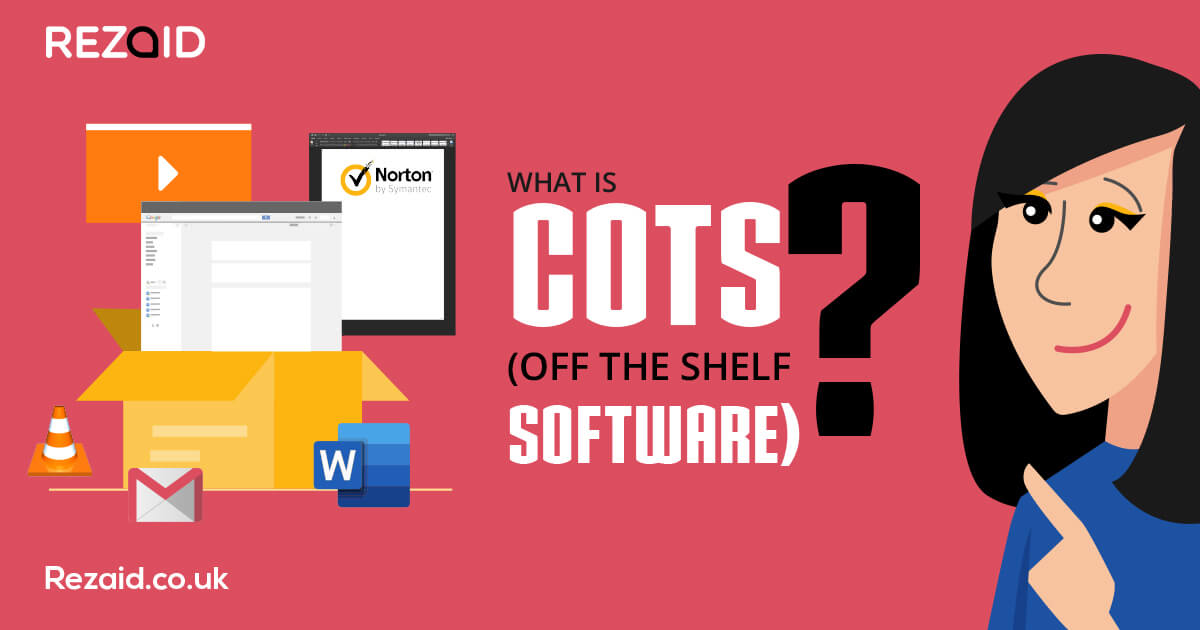
Buying any software solution can be quite daunting because:
- There are a bewildering array of software products and services available in the marketplace.
- The efficiency of a business can so easily be adversely affected if the wrong solution is chosen. In this case, costing time and money.
Once an organisation has identified the need for implementing a new software solution, the question “Should you buy or build?” needs addressing next.
To answer this not so simple question, you will need to undertake research to understand better the out-of-the-box solutions that are available keeping in mind all the while your specific business requirements.
To help, we have given below an overview of off the shelf software – also referred to as commercial off the shelf (COTS), prepackaged, shrink wrapped, and canned software.
Off the Shelf Software Defined
Off the shelf software are standardised software applications that are mass-produced, available to the general public, and fit for immediate use. They are designed for a broad range of customers, offering a comprehensive set of features to streamline operations.
Off-the-shelf software is pre-designed, commercially available software developed for a wide range of users and common tasks. It is ready to use immediately after purchase without customization. Examples include Microsoft Office or Adobe Photoshop. It is usually cost-effective and widely supported.
Key Attributes of COTS Software
1) Cost-Effective – especially in the initial stages
Off the shelf software is generally cheaper if we take into account just the initial price. This is because the costs are spread over a large number of buyers as numerous copies of it are sold. However, things like recurring subscription fees, license and update charges along with the cost of getting additional support from third party vendors tend to add up over time, which in some cases makes the software expensive in the long run.
From the outset, you will have an accurate estimate of the costs that you will incur. Plus, you can have access to a trial version, usually for free and for a fixed period of time.
2) Convenience
Given that off the shelf software is used by various entities, there are plenty of guides, tutorials, and lists of best practices that can aid you in deploying it effectively.
In addition to being already tried and tested by experts, the vendors of off the shelf software provide regular updates to ensure that the software is always adapting to the growing needs of businesses. What’s even better is that off the shelf software is well-documented, certified, and industry standards and privacy regulations compliant. So, you can get on with using it and not concern yourself with developing and maintaining the software.
3) Customisation
As mentioned, off the shelf software has a standard yet sophisticated design, because its target market is quite extensive. Hence, you can expect there will be plenty of additional features, functions, and add-ons that will likely be of little or no use included. For instance, it has been estimated that on average only 10 per cent of Microsoft Word users make use of all the product feature set. Conversely, it is also very likely that an off the shelf software product might not cater to all your specific requirements. This is where software customisation comes into play.
Many off the shelf software products allow users to customise the solution to their needs. This may involve integrating with other software products and services, or it could be fine tuning the software’s existing features and functions. Whatever customisation is undertaken, the work inevitably requires at least a rudimentary understanding of software development principles along with product sector knowledge. This process often requires a clear and strategic approach, much like using a story mountain to structure and develop a compelling narrative. Many off the shelf software products allow users to customise the solution to their needs. Effective ux analysis helps ensure these customizations truly improve user satisfaction.
Off the Shelf Software Examples
- Gmail and Microsoft are elemental and generic software products designed to support common functionalities such as emailing and file sharing. These are secure solutions that are even customisable to an extent as enterprises can make their own private accounts.
- Advanced Customer Relationship Management (CRM) software such as Salesforce CRM, Insightly, HubSpot CRM, and Zoho CRM – all are ready-made, user-friendly solutions for those looking for CRM suites.
- Enterprise Resource planning (ERP) software such as SAP ERP by Oracle, Sage Intacct, and Microsoft Dynamics.
- Sage, Xero, Quickbooks and KashFlow are all accounting software applications that allow businesses to quickly and easily produce a plethora of financial reports.
- Video games such as FIFA, Call of Duty, and Angry birds.
- Antivirus programs including, but not limited to, Bitdefender, Norton, and Kaspersky.
- Media players such as VLC Media Player and Windows Media Player.
Conclusion
Off the shelf software is a fit for use solution that your business will – with some scope for customisation and integration- have to work with. It’s not a solution for everyone, and whilst it offers convenience inexpensively, flexibility and the opportunity for gaining a competitive advantage -since all your competitors will be using the exact same product- can be lost.
If the latter is a key determinant then might have to take a careful look at bespoke software and what it has to offer. Just like a customized website only provides customized products, for example, a website that specializes in Pin Badges will mainly provide pin badges for customers. This is how customized software realizes function customization, which can better solve problems.
Consider the nature of your enterprise, the scalability you require, and your short versus long-term goals before making the right choice for your software needs. In short, begin with the end in mind.


